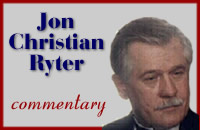Other
Ryter
Articles:
The Two Kerry's:
War Hero or
Traitor?
"Men in Black" The Cult of The Judges
HILLARY,
JOHN AND BARAK
PART 2 of 2
By Jon Christian Ryter
July 25, 2007
NewsWithViews.com
Dr. Chaoulli purchased a mobile operating room�a large white van with "Emergency Medicine 24 Hours" painted in large block letters on both sides of the vehicle. The van, equipped with portable electrocardiogram, an X-ray machine and intravenous equipment needed to give a lifesaving blood transfusion sat, unused, in the driveway of Dr. Chaoulli's home. The Quebec government told the physician is was unlawful for him to use the van�and it is unlawful for the physician to accompany his "emergency" patients to the hospital since he opted out of Quebec's healthcare system and was deemed, by the government, as no longer certified under the public health system. Physicians who opt out of Quebec's public health system, are prohibited under the Quebec Health Care Act from providing private medical services in public health hospitals. In addition, the Quebec Hospital Insurance Act denies the patients of private practice doctors from buying insurance to cover their private medical costs.
When he filed his original lawsuit in Quebec's Superior Court, Chaoulli said that he did so only because he felt he had an obligation to his patients. He argued that the terms of the Quebec Health Care Act violated his rights as a Canadian physician, and the personal and professional freedoms of Quebecers who came to him for medical care. After two years, the case�now referred to by the Canadian media as the Chaoulli Decision�arrived at the arch-liberal Supreme Court of Canada [SCC] where all of the pundits predicted Chaoulli's argument would fall on deaf ears.
The SCC shocked everyone�particularly the bureaucrats who have controlled Canada's healthcare system with an iron hand since 1984. On June 9, 2007 in a 4 to 3 opinion, the high court struck down the 23-year old law and gave private practice physicians in Canada a resounding victory. The 3-member minority argued it was not the job of the court to settle long-standing debates between private enterprise the the public health care system.
SCC Chief Justice Beverley McLachllin and Justice John Major (who wrote the majority opinion) said: "The evidence in this case shows that delays in the public health care system are widespread, and that, in some serious cases, patients die as a result of waiting lists for public health care." Their decision was only the first chorkle of a death thrall that could take up to a decade since before the public health system can be partially dismantled�into a public health system for the poor and the elderly similar to that in the United States�all ten Canadian provinces and Canada's three territories must align their health care systems to comply with the Chaoulli Decision. And private insurance companies must now step up to the plate with new insurance products modeled after those used in the United States.
When Chaoulli challenged Quebec's monopoly on healthcare, one of his private practice patients, George Zeliotis, a retired businessman joined him as co-plaintiff. Zeliotis argued that he's a casualty of the existing system. The 67-year-old retired businessman told the court he waited almost a year for hip-replacement surgery in 1997. While he was on the waiting list for surgery, he was immobile and in great distress. He told the court that he appealed to politicians, hospital administrators�and even the media�for help. "The pain was intolerable," he told the media during a break in the trial. He said he would have gladly paid for private surgery had it been legal. "At night I couldn't sleep. The only thing to relieve my pain was the surgery. There was no choice. Day by day I was hoping the telephone would ring and someone would help me. Any future surgery could [also] be delayed. I wouldn't be able to govern my life."
Zeliotis hired a lawyer to plead his case. Chaoulli represented himself. One of Chaoulli's key witnesses was Dr. Edward Coffey, past president of the Quebec Medical Association�and a longstanding advocate of parallel private and public health care systems in Canada. Coffey told the court that Canada was the only industrialized nation in the world not to offer its citizens a choice between public and private health care.
Keep that mind when Hillary, John and Barack argue that the United States and Mexico are the only industrialized nations that do not offer universal healthcare. No other industrialized nation except their healthcare "model"�which has failed�mandates that the citizens of that nation must use the State's universal healthcare system to the exclusion of any private system. Hillary's Health Security Act would have required every American to use the public health system�or go without treatment. No private practice physician under Hillary's Health Security Act would have been allowed to treat a patient who was declined for a procedure by the public health system.
Dr. Coffey testified that "...in a parallel, noncompetitive health insurance system, everyone pays into the universal public system but also has the option of paying for private health insurance." He countered the criticism of the government's lawyers that allowing private and public health insurance to coexist would create one system for the rich and another for the poor. "It is not only the wealthy who buy insurance," Coffey said. "Almost half the private insurance bought today is purchased by those earning $30 thousand or less." He also noted that an unofficial, two-tiered medical system already existed in Canada and that those with education and "connections" already jump to the front of the line.
According to the Fraser Institute, on the average in Canada, it takes 20 weeks to get an appointment with a specialist�21 weeks for a neurosurgeon. However, it only takes about 3 weeks to see an oncologist. According to Dr. David Gratzer, a registered physician in the Canadian system, "If you're healthy and willing to wait, [the Canadian healthcare system] is the best system in the world. What you discover," he added, "is there are wait times in Canada for any condition." Sadly, many times the waiting period is fatal.
Barry Stein, a Montreal lawyer with metastatic colon cancer was just one of a score of witnesses�both patients and family members of deceased patients�who sought medical treatment they could not get because they were on the tail-end of miles long waiting lists in their provinces and could not, under existing rules, go to another province to get treatment. Stein sought medical treatment in New York after being put on a surgery and chemotherapy waiting list. Despite the urgency of Stein's condition, his surgery was postponed 3 times due to hospital overcrowding. The Regie de l'assurance-maladie du Quebec, which is responsible for operating the province's health insurance system, denied his request in 1996 even though the surgical insertion of an internal chemotherapy pump that was not available in Canada, was recommended�and deemed medically necessary. In 1996 Stein asked the Regie de l'assurance-maladie du Quebec to reimburse his expenses for the treatment in the United States. When the government refused, he petitioned Quebec's Superior Court to review their decision. In August 1999�3 years later�the health care system was ordered to reimburse him for the medical costs. Had Stein not been a man of some means, he would have died long before Quebec authorized the payment for help�or the treatment itself.
Dr. Daniel Doyle, a Quebec cardiovascular surgeon, described to the Canadian court how several of his patients, on waiting lists for bypass surgery, died. The average wait for a bypass was from six to eight months. An ophthalmologist testified that many patients go blind while waiting up to 18 months for cataract surgery. The incidents of patients dying while waiting for treatment are almost pandemic. Public health officials, who were not concerned before the Chaoulli Decision, are scrambling to find solutions to that one issue in order to keep their medical house of cards from tumbling down around them.
Colin McMillan, president of the Canadian Medical Association, attributed the long waits to a lack of capacity in the healthcare system on a government austerity program during the 1990s. To save money, the Canadian government curbed the importation of physicians from other countries and cut back on the number of doctors they were willing to train domestically. "We thought there was a surplus of doctors," McMillan admitted, adding, "we thought we could save some money." That's generally what happens when bureaucrats are put in charge of anything other than counting beans in a jar. When bureaucrats are allowed to treat people like numbers, people stop being flesh and blood and simply become statistics.
To Hillary, John and Barack, we are simply demographic statistics. You can see "us" in the colorful spread sheets these plutocrats use to show America how they are going to insure every American like they do in Canada. Every American, regardless of age or health, will be insured�just like they are in Canada. And the New Democrats will will do it for less money than we currently spend in our private insurance plans�just like the Canadians. At the expense of our loved ones�and perhaps us. They will fail. Just like the Canadians.
And, finally, there is a reality about socialized medicine that most people don't want to even contemplate. Government suddenly has control over whether you live or die when you become seriously ill. When the Democratically-controlled Congress passed the Omnibus Budget Reconciliation Act of 1990, they buried an amendment in the budget bill called the Patient Self-Determination Act of 1990. PSDA required hospitals to ask elderly patients and those with severe chronic conditions, or those whose medical conditions would continue to decline, to sign living wills.
The legislation was worded in such a way to imply that patients were being allowed to more actively participate in decisions about their own treatment. In reality, the legislation was a euthanasia amendment designed to lighten the bureaucracy's financial obligation for the elderly by [a] euthanizing them when its determined they will likely not improve sufficiently to lead a fairly productive, normal life, and [b] ending the government's obligation to continue sending them Social Security checks. Its pretty much like killing two birds with one stone�if you pardon the pun.
|
Subscribe to the NewsWithViews Daily News Alerts! |
Thank God for selfless, caring Democrats like Hillary, John and Barack. Hope we all live long enough under their universal healthcare plans to appreciate them for their selflessness. For part one click below.
Click
here for part -----> 1,
� 2007 Jon C. Ryter - All Rights
Reserved
[Read "Whatever Happened to America?"]
Sign Up For Free E-Mail Alerts
E-Mails
are used strictly for NWVs alerts, not for sale
Jon Christian Ryter is the pseudonym of a former newspaper reporter with the Parkersburg, WV Sentinel. He authored a syndicated newspaper column, Answers From The Bible, from the mid-1970s until 1985. Answers From The Bible was read weekly in many suburban markets in the United States.
Today, Jon is an advertising executive with the Washington Times. His website, www.jonchristianryter.com has helped him establish a network of mid-to senior-level Washington insiders who now provide him with a steady stream of material for use both in his books and in the investigative reports that are found on his website.
E-Mail: BAFFauthor@aol.com
And, finally, there is a reality about socialized medicine that most people don't want to even contemplate. Government suddenly has control over whether you live or die when you become seriously ill.














